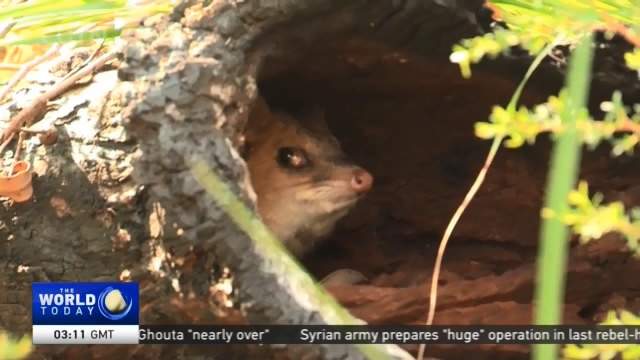
11:42, 30-Mar-2018
Saving Eastern Quoll: Australia scientists attemt to bring back populations of endangered species

One group in Australia is attempting to bring back the population of eastern quolls -- a small carnivorous marsupial -- from the brink of extinction. According to the Australian Conservation Foundation, the country has lost more species to extinction than any other in the world. Greg Navarro has the story.
After a slow and bumpy drive through Booderee National Park, and an even slower walk through the thick bush, a seemingly impossible task begins.
Scientists are trying to track the movements of 19 eastern quolls in an area that covers more than 60 square kilometres along the New South Wales coast.
The animals were fitted with radio collars when they were released here from Tasmania 2 weeks ago. The goal is to reintroduce the endangered cat-sized carnivores to Australia's mainland - last seen here more than 50 years ago.
ROB BREWSTER DIRECTOR, REWILDING AUSTRALIA "They are a small animal, their threats are vast, they have predators in the environment."
That's just what happened to one of the released quolls - its radio collar was found inside a python's stomach.
GREG NAVARRO JERVIS BAY "The animal's favourite habitat so far here appears to be these hollowed out logs. The problem is in a park this size there are thousands and to be able to inspect each one would take years."
That's why scientists are relying on technology to track their movements. After more than an hour of following a faint signal - a brief glimpse of a wary quoll - and an early positive sign for the program.
NICK DEXTER PARKS SERVICES MANAGER, BOODEREE NATIONAL PARK "It means that they have gotten over some of the initial shock of translocation - being taken from captivity to the wild."
Eastern quolls were once plentiful on Australia's mainland.
CHRIS MACGREGOR SENIOR RESEARCH OFFICER, AUSTRALIA NATIONAL UNIVERSITY "Unfortunately human culling, disease and the presence of introduced predators like the European Red Fox really caused major declines."
What worries scientists the most is the broader impact from losing so many species here to extinction.
ROB BREWSTER DIRECTOR, REWILDING AUSTRALIA "If we don't have evolution happening we will end up with a world that is completely degraded. it will have less biodiversity and that biodiversity supports human life as well."
Which is why the program was created, to see if this kind of ambitious relocation is even possible.
CHRIS MACGREGOR SENIOR RESEARCH OFFICER, AUSTRALIA NATIONAL UNIVERSITY " I'll be really happy when we see young quolls, then we know that they are successfully breeding here and they are establishing their population."
And what it could mean for other endangered species? Greg Navarro, CGTN, Jervis Bay.

SITEMAP
Copyright © 2018 CGTN. Beijing ICP prepared NO.16065310-3
Copyright © 2018 CGTN. Beijing ICP prepared NO.16065310-3